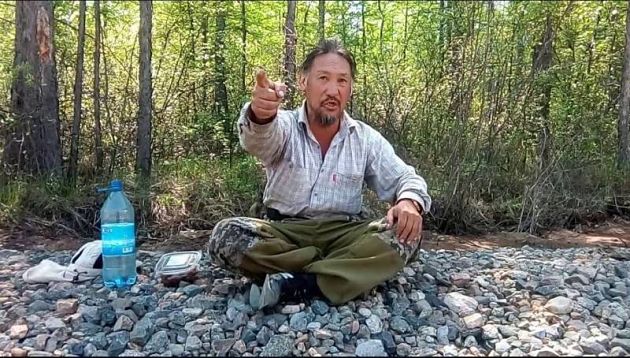Today’s noisy arrest in Buryatia of Yakut shaman Alexander Gabyshev (pictured), who was on his way to Moscow to “exorcise” Vladimir Putin from the Kremlin, can be seen as the predictable outcome of an exotic story. Or it could be something bigger.
In this connection, it is impossible not to notice that Albert Razin, who committed self-immolation and caused a huge resonance in the national circles of the indigenous peoples of Russia, was not only an Udmurt scientist and activist, but also an Udmurt “priest” and a follower of the Udmurt pantheistic religion. The leader of the neighboring Erzyan movement, Syyryys Bolyaen (who complained to PACE about the suppression of this story in the Russian media), is also a “priest” of the local religion and is currently trying to draw Europe’s attention to the Razin tragedy.
Can these facts be considered a simple coincidence? Or is it a new tendency – a reaction to the imposition of “remnants” of the Russian Orthodox Church in the form of representatives of Russified peoples who turn to local cults that are being reconstructed before our eyes? Incidentally, this process is also taking place among the Russians themselves – the Russian Orthodox Church has been alarmed several times by the spread of so-called “Rodnovery” or “Neo-Paganism”, which has many followers among Russian nationalists.
But what about “Abrahamic” religions? This week, a discussion within the Russian Orthodox Church (ROC) caused a stir when several dozen priests spoke out against the ongoing political repression in the country. Some hoped that the ROC (specifically the Moscow Patriarchate, founded under Stalin) could be “different” and “engage with society”. However, this was almost immediately met with a shout from the top – the deputy head of the Department for Church Relations with Society and the Media, Vakhtang Kipshidze, condemned the self-activity of the conscientious priests, calling their statement an attempt to engage in human rights activities that had de facto turned into a political statement. This is not surprising, since, as we have written before, the leadership of the ROC does not intend to hide its attitude towards protests and those who suppress them.
But what about Muslims? It is not surprising that at the national level they show remarkable calmness in the midst of the intensifying neo-pagans and even ROC priests. Basically, this silence is a graveyard to which the present regime has sent the Islamic community of Russia, depriving it of active representatives, some of whom have been killed, others imprisoned, others forced into exile or simply intimidated. This happened precisely because this regime was afraid of the political potential of Islam as a factor that consolidates the Muslim peoples of Russia and is capable in the future of attracting oppressed representatives of non-Muslim peoples who are currently seeking a way out of their deplorable situation through paganism.
However, it would be wrong to say that Islam in Russia has irreversibly lost this potential. Today, Muslims are largely biding their time, knowing full well that under the conditions of the current regime, the reaction to any of their even moderate political initiatives will be much harsher than the reaction to the protests of Moscow opposition activists or even the journey of the Yakut shaman. A vivid confirmation of this are the cases of very cautious and careful in their statements Abdulmumin Gadzhiev and now Dageer Khasavov – a lawyer who suffered for his sharp statements about the persecution of Muslims in the “Russian Federation” (we remind you that the Federation in Russia has been de facto abolished, as well as the Constitution).
Therefore, the time has not yet come for the Islamic factor to make its voice heard in politics, simply because such an opportunity does not exist in Putin’s Russia. However, it is worth observing the above-mentioned processes carefully and understanding that if the Islamic factor does not properly assert itself in future political processes, other contenders will take its place…

